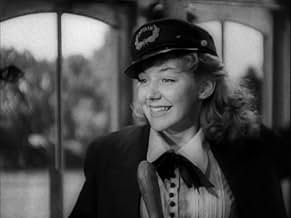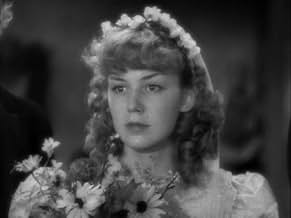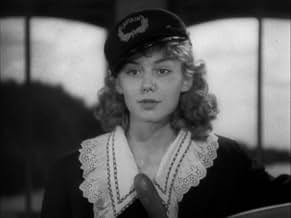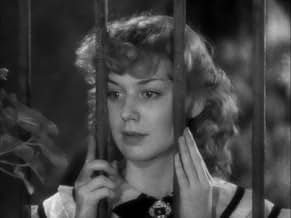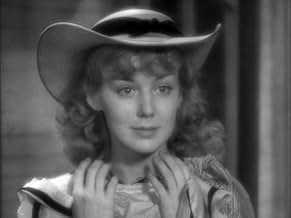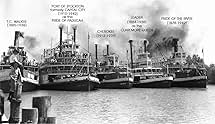IMDb RATING
6.9/10
1.4K
YOUR RATING
A Louisiana con man enters his steamboat into a winner-take-all race with a rival while trying to find a witness to free his nephew, about to be hanged for murder.A Louisiana con man enters his steamboat into a winner-take-all race with a rival while trying to find a witness to free his nephew, about to be hanged for murder.A Louisiana con man enters his steamboat into a winner-take-all race with a rival while trying to find a witness to free his nephew, about to be hanged for murder.
- Director
- Writers
- Stars
- Awards
- 3 wins total
C.E. Anderson
- Jailer
- (uncredited)
Sam Baker
- Undetermined Role
- (uncredited)
William 'Billy' Benedict
- Breck
- (uncredited)
Heinie Conklin
- Jailbird
- (uncredited)
Tex Cooper
- Townsman
- (uncredited)
D'Arcy Corrigan
- Hangman
- (uncredited)
Luke Cosgrave
- Labor Boss
- (uncredited)
- Director
- Writers
- All cast & crew
- Production, box office & more at IMDbPro
Featured reviews
Snake oil salesman Doctor John Pearly (Will Rogers) makes a bet with Captain Eli to race steamboats. He has to fix up an old steamboat. He hopes to have his nephew Duke as the pilot. Duke brings along swamp gal Fleety Belle who was abused by her family. He had killed a man. It's self-defense but the only witness is preacher The New Moses who has since gone away. Following John's advice, Duke turns himself in. He is set to hang unless the preacher is found.
There is a basic structural issue with the premise and the movie. The movie wants to be a fun, light-weight, silly steamboat race. On the other hand, nephew Duke is threatened with hanging and there is supposed to be danger. These two things often do not mix well together. For example, they need to find The New Moses who is often found on the river. One would expect John to be piloting his steamboat up and down the river spreading the word and looking for the preacher. Instead, he ends up spending his time racing and by happenstance run into the preacher. The race is plenty fun and then we're reminded that Duke is about to be hanged. It's a wacky hanging party.
There is a basic structural issue with the premise and the movie. The movie wants to be a fun, light-weight, silly steamboat race. On the other hand, nephew Duke is threatened with hanging and there is supposed to be danger. These two things often do not mix well together. For example, they need to find The New Moses who is often found on the river. One would expect John to be piloting his steamboat up and down the river spreading the word and looking for the preacher. Instead, he ends up spending his time racing and by happenstance run into the preacher. The race is plenty fun and then we're reminded that Duke is about to be hanged. It's a wacky hanging party.
It's funny to think that when this film was made, it was about a time in the early 1890's, only 35 years earlier than it's production. Now we are looking back almost 75 years at the film itself. I expected a light wacky comedy, but there is definitely a well-rounded plot here revolving around murder in self-defense. Will Rogers gives a very skilled and sympathetic performance, but some of the more hilarious gags in this are gifts from the writers.
The sheriff/preacher's wedding speech goes right up there with Donald Sutherland's in "Little Murders" for sheer comic value.
A great throwaway gag involves the search for the New Moses, when they accidentally run into the New Elijah instead!
Steppin Fetchit, while no great symbol for African Americans, actually plays against his lazy type in this, and his hard work and quick thinking actually save the day on a couple occasions.
A great (and uncommon) saw-playing musical interlude!
To me, the only major weakness was Ms. Shirley as the ingenue. She was quite likable, but did not seem to have lived as hard as her character was supposed to have.
All told, a winner of a film for fans of the 1930's view of the 1890's.
The sheriff/preacher's wedding speech goes right up there with Donald Sutherland's in "Little Murders" for sheer comic value.
A great throwaway gag involves the search for the New Moses, when they accidentally run into the New Elijah instead!
Steppin Fetchit, while no great symbol for African Americans, actually plays against his lazy type in this, and his hard work and quick thinking actually save the day on a couple occasions.
A great (and uncommon) saw-playing musical interlude!
To me, the only major weakness was Ms. Shirley as the ingenue. She was quite likable, but did not seem to have lived as hard as her character was supposed to have.
All told, a winner of a film for fans of the 1930's view of the 1890's.
10zootjim
I first saw this movie with my grandfather fifty years ago. Our small-town theater was having classic movie month and Will Rogers was my grandfather's favorite. For a ten-year old boy this movie made a lasting impression of the freedom and romance once available to us in America but now lost forever. Aside from the instantly believable story line about an uncle and his orphaned nephew going together to buy an aging Mississippi River steamboat the pathos applies superbly to this day. The young man meets a girl, gets in a fight over her and is in trouble with the law. The kind uncle moves heaven and earth to help his deceased sister's son. The characters are all period and realistic according to my grandfather who knew people just like that. America was a religious nation in those days, especially the South, so the use of religious terms in common speech is authentic. The thing to watch for in this film is the steamboat race. In 1935 the steamboat's day was already past, and to find that many operating steamboats to make the film must have been a task. Then...listen closely to the melodious whistles. Different pitches and echoes, made by live steam. Steam power built modern America, and the sound of a live steam whistle, once so common, is all but vanished now. I have to yield to my grandfather's opinion of the movie, not having lived in those times myself, and he said it was quite authentic, down to the use of pitch, kerosene or whatever was handy to get more speed out of the engines. The fact that a regular person felt he could go speak to a state governor in person is also part of our American heritage. There was not the class distinction (at least among whites) that there is today. This movie is a priceless treasure, and youngsters definitely need to see it. Anne Shirley, swamp girl, becomes sweet because she admits she is won over by the tenderness of Uncle John.
The actual last film that Will Rogers shot was this one, Steamboat Round The Bend. Doubting Thomas and In Old Kentucky which were released afterward were actually shot earlier. This is also the third and last film in which John Ford directed Will Rogers.
In this film Rogers is pure and simple a medicine show conman who has a floating museum on the Mississippi. That's just to lure the customers in, his money is made selling his particular brand of snake oil guaranteed to cure everything under the sun and where it doesn't shine.
Rogers has a nephew however whom he loves dearly and said nephew John McGuire loves a mountain girl Anne Shirley. In fact he killed a man who tried to take her away and there's only one witness, a crazy old revivalist Berton Churchill.
John Ford loved using Berton Churchill when he could and his most famous use of him was in Stagecoach as the banker Gatewood skipping town with the bank's assets. He's so different here decked out in a bedsheet with a long beard and calling himself 'the New Moses'. But this guy is the only one who can get McGuire off as he's the only witness to the homicide and the only one who can swear it was self defense. So Rogers is hunting up and down the river for him.
Which brings him into a steamboat race with a bunch of other captains and particularly a rival of Rogers, Irvin S. Cobb. Ford indulges in a little inside joke with Cobb who was a country humorist like Rogers himself. Will's steamboat is the Claremore Queen and Cobb has the Pride Of Paducah. Claremore, Oklahoma and Paducah, Kentucky were where both men hailed from respectively.
The Rogers films and also films like Young Mr. Lincoln are John Ford at his best. Early Americana was a period Ford loved and a lot of loving care went into Steamboat Round The Bend.
By the way that snake oil that Rogers peddles proves to have some real value after all. More I can't say.
Rogers is at his folksy best, but I did love Berton Churchill as the 'New Moses' who's also running his own con game. Steamboat Round The Bend is a wonderful introduction to Will Rogers. We've never seen his like again and who knows if we ever will.
In this film Rogers is pure and simple a medicine show conman who has a floating museum on the Mississippi. That's just to lure the customers in, his money is made selling his particular brand of snake oil guaranteed to cure everything under the sun and where it doesn't shine.
Rogers has a nephew however whom he loves dearly and said nephew John McGuire loves a mountain girl Anne Shirley. In fact he killed a man who tried to take her away and there's only one witness, a crazy old revivalist Berton Churchill.
John Ford loved using Berton Churchill when he could and his most famous use of him was in Stagecoach as the banker Gatewood skipping town with the bank's assets. He's so different here decked out in a bedsheet with a long beard and calling himself 'the New Moses'. But this guy is the only one who can get McGuire off as he's the only witness to the homicide and the only one who can swear it was self defense. So Rogers is hunting up and down the river for him.
Which brings him into a steamboat race with a bunch of other captains and particularly a rival of Rogers, Irvin S. Cobb. Ford indulges in a little inside joke with Cobb who was a country humorist like Rogers himself. Will's steamboat is the Claremore Queen and Cobb has the Pride Of Paducah. Claremore, Oklahoma and Paducah, Kentucky were where both men hailed from respectively.
The Rogers films and also films like Young Mr. Lincoln are John Ford at his best. Early Americana was a period Ford loved and a lot of loving care went into Steamboat Round The Bend.
By the way that snake oil that Rogers peddles proves to have some real value after all. More I can't say.
Rogers is at his folksy best, but I did love Berton Churchill as the 'New Moses' who's also running his own con game. Steamboat Round The Bend is a wonderful introduction to Will Rogers. We've never seen his like again and who knows if we ever will.
Minor Ford at his most homespun and with Will Rogers in the lead they don't come much more homespun than this piece of Americana. Of course, minor Ford is still pretty good when set beside some of his rivals. This one is almost a companion piece to "Judge Priest" with Rogers' steamboat captain racing his boat against a rival while trying to clear his nephew from a charge of murder. Rogers is excellent and there's a fine supporting cast of Ford regulars but as the young lovers Anne Shirley and John McGuire are terrible. Still, it's richly atmospheric, at times verging on the poetic and if you think the scenes with Stepin Fetchit are more than a little racist try to remember when it was made and the period in which it is set and put it into some kind of historical perspective and be thankful we are living in more enlightened times. The race itself, (and it's a long time coming), is superb.
Did you know
- TriviaThe film was released shortly after Will Rogers' death on 15 August 1935 from an airplane crash near Point Barrow, Alaska with noted aviator Wiley Post. Originally, the ending of the film had him waving goodbye to the character played by Irvin S. Cobb, but the ending was changed to avoid the audience thinking he was saying goodbye to them, which may have caused them to leave the theater in tears. Cobb urged the ending not be changed. The review which appeared in Variety 25 September 1935 indicated the film had been "announced" as 102 minutes, but had been considerably shortened, which no doubt accounts for some problems in continuity and the abrupt ending.
- GoofsAt the end of the race, an official on a stand is waving a black and white checkered flag. A title card at the beginning of the film states this film is set in the early 1890s. The earliest known use of a checkered flag to signify the end of a race was for the 1906 Vanderbuilt Cup auto race.
- Quotes
New Moses: I've got souls to save.
Doctor John Pearly: No, you got a life to save, and the Lord don't care which one of your jobs you do first.
- ConnectionsFeatured in Directed by John Ford (1971)
- SoundtracksSteamboat Round the Bend
(1935) (uncredited)
Music by Oscar Levant
Lyrics by Sidney Clare
Sung by an unidentified chorus during opening sequence and played during closing credits
- How long is Steamboat Round the Bend?Powered by Alexa
Details
- Release date
- Country of origin
- Language
- Also known as
- Steamboat Bill
- Filming locations
- San Joaquin River, California, USA(River and Delta at Stockton: steam ships, rivers channels)
- Production company
- See more company credits at IMDbPro
- Runtime
- 1h 22m(82 min)
- Color
- Aspect ratio
- 1.37 : 1
Contribute to this page
Suggest an edit or add missing content

